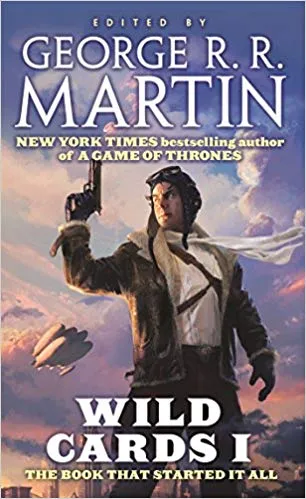
Anthologize Me, Netflix
This content contains affiliate links. When you buy through these links, we may earn an affiliate commission.
Two major Netflix adaptations were announced this week: a new version of Daphne du Maurier’s Rebecca, directed by Ben Wheatley and starring Lily James and Armie Hammer, and a series adaptation of Wild Cards, the long-running (seriously, 1987–present) anthology series edited by George R.R. Martin (you may have heard of him).
I am pretty excited about Rebecca, pending proper casting for Mrs. Danvers, but what I really want to talk about is Wild Cards. I read the first book in the late ’90s and fell madly in love, only to read on in the series and fall right back out of love. But wait, let me give you a quick overview first.
 “There is a secret history of the world―a history in which an alien virus struck the Earth in the aftermath of World War II, endowing a handful of survivors with extraordinary powers. Some were called Aces―those with superhuman mental and physical abilities. Others were termed Jokers―cursed with bizarre mental or physical disabilities. Some turned their talents to the service of humanity. Others used their powers for evil. Wild Cards is their story.” —description from Amazon.com
So, the first book is historical fiction, starting during World War II with Jet Boy, progressing through the ’50s and giving a new twist on the House Un-American Activities Committee hearings with Golden Boy, and introducing characters I loved, like Croyd, the teenager who sleeps for months at a time and wakes up with a new form every time. After that first book, the stories carry on in modern times, progressing in real(ish) time and focusing on characters both established and new…but most of the characters I had come to care about were written out, and there was entirely too much focus on tantric sex (yes, really). I lost interest, but remained in love with the premise.
The books—at least the early ones—are pretty dude-heavy, and white dude–heavy at that, but the constant present of writer, co-editor, and now executive producer Melinda Snodgrass kept them from being a total dudetopia. (I assure you that is a play on dystopia, not utopia.) The more recent series is far more inclusive, with authors like Saladin Ahmed picking up where the series left off and carrying on.
“There is a secret history of the world―a history in which an alien virus struck the Earth in the aftermath of World War II, endowing a handful of survivors with extraordinary powers. Some were called Aces―those with superhuman mental and physical abilities. Others were termed Jokers―cursed with bizarre mental or physical disabilities. Some turned their talents to the service of humanity. Others used their powers for evil. Wild Cards is their story.” —description from Amazon.com
So, the first book is historical fiction, starting during World War II with Jet Boy, progressing through the ’50s and giving a new twist on the House Un-American Activities Committee hearings with Golden Boy, and introducing characters I loved, like Croyd, the teenager who sleeps for months at a time and wakes up with a new form every time. After that first book, the stories carry on in modern times, progressing in real(ish) time and focusing on characters both established and new…but most of the characters I had come to care about were written out, and there was entirely too much focus on tantric sex (yes, really). I lost interest, but remained in love with the premise.
The books—at least the early ones—are pretty dude-heavy, and white dude–heavy at that, but the constant present of writer, co-editor, and now executive producer Melinda Snodgrass kept them from being a total dudetopia. (I assure you that is a play on dystopia, not utopia.) The more recent series is far more inclusive, with authors like Saladin Ahmed picking up where the series left off and carrying on.
A Quick Overview of the Wild Cards Universe
 “There is a secret history of the world―a history in which an alien virus struck the Earth in the aftermath of World War II, endowing a handful of survivors with extraordinary powers. Some were called Aces―those with superhuman mental and physical abilities. Others were termed Jokers―cursed with bizarre mental or physical disabilities. Some turned their talents to the service of humanity. Others used their powers for evil. Wild Cards is their story.” —description from Amazon.com
So, the first book is historical fiction, starting during World War II with Jet Boy, progressing through the ’50s and giving a new twist on the House Un-American Activities Committee hearings with Golden Boy, and introducing characters I loved, like Croyd, the teenager who sleeps for months at a time and wakes up with a new form every time. After that first book, the stories carry on in modern times, progressing in real(ish) time and focusing on characters both established and new…but most of the characters I had come to care about were written out, and there was entirely too much focus on tantric sex (yes, really). I lost interest, but remained in love with the premise.
The books—at least the early ones—are pretty dude-heavy, and white dude–heavy at that, but the constant present of writer, co-editor, and now executive producer Melinda Snodgrass kept them from being a total dudetopia. (I assure you that is a play on dystopia, not utopia.) The more recent series is far more inclusive, with authors like Saladin Ahmed picking up where the series left off and carrying on.
“There is a secret history of the world―a history in which an alien virus struck the Earth in the aftermath of World War II, endowing a handful of survivors with extraordinary powers. Some were called Aces―those with superhuman mental and physical abilities. Others were termed Jokers―cursed with bizarre mental or physical disabilities. Some turned their talents to the service of humanity. Others used their powers for evil. Wild Cards is their story.” —description from Amazon.com
So, the first book is historical fiction, starting during World War II with Jet Boy, progressing through the ’50s and giving a new twist on the House Un-American Activities Committee hearings with Golden Boy, and introducing characters I loved, like Croyd, the teenager who sleeps for months at a time and wakes up with a new form every time. After that first book, the stories carry on in modern times, progressing in real(ish) time and focusing on characters both established and new…but most of the characters I had come to care about were written out, and there was entirely too much focus on tantric sex (yes, really). I lost interest, but remained in love with the premise.
The books—at least the early ones—are pretty dude-heavy, and white dude–heavy at that, but the constant present of writer, co-editor, and now executive producer Melinda Snodgrass kept them from being a total dudetopia. (I assure you that is a play on dystopia, not utopia.) The more recent series is far more inclusive, with authors like Saladin Ahmed picking up where the series left off and carrying on.











